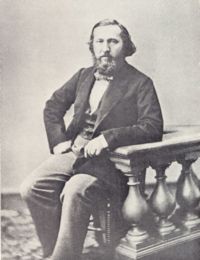
Konstantin Aksakov
Encyclopedia

Russia
Russia or , officially known as both Russia and the Russian Federation , is a country in northern Eurasia. It is a federal semi-presidential republic, comprising 83 federal subjects...
n critic and writer, one of the earliest and most notable Slavophile
Slavophile
Slavophilia was an intellectual movement originating from 19th century that wanted the Russian Empire to be developed upon values and institutions derived from its early history. Slavophiles were especially opposed to the influences of Western Europe in Russia. There were also similar movements in...
s. He wrote plays, social criticism, and histories of the ancient Russian social order. His father Sergey Aksakov was a writer, and his younger brother Ivan Aksakov
Ivan Aksakov
Ivan Sergeyevich Aksakov was a Russian littérateur and notable Slavophile. He was the son of Sergey Aksakov and younger brother of Konstantin Aksakov. He was born in what is now Bashkortostan....
was a journalist.
Konstantin was the first to publish an analysis of Gogol's Dead Souls
Dead Souls
Dead Souls is a novel by Nikolai Gogol, first published in 1842, and widely regarded as an exemplar of 19th-century Russian literature. Gogol himself saw it as an "epic poem in prose", and within the book as a "novel in verse". Despite supposedly completing the trilogy's second part, Gogol...
, comparing the Russian author with Homer
Homer
In the Western classical tradition Homer , is the author of the Iliad and the Odyssey, and is revered as the greatest ancient Greek epic poet. These epics lie at the beginning of the Western canon of literature, and have had an enormous influence on the history of literature.When he lived is...
(1842). After Tsar Alexander II
Alexander II of Russia
Alexander II , also known as Alexander the Liberator was the Emperor of the Russian Empire from 3 March 1855 until his assassination in 1881...
's accession to the throne, he sent him a letter advising to restore Zemsky sobor
Zemsky Sobor
The zemsky sobor was the first Russian parliament of the feudal Estates type, in the 16th and 17th centuries. The term roughly means assembly of the land. It could be summoned either by tsar, or patriarch, or the Boyar Duma...
s (1855). Aksakov also penned a number of articles on Slavonic linguistics
Linguistics
Linguistics is the scientific study of human language. Linguistics can be broadly broken into three categories or subfields of study: language form, language meaning, and language in context....
.
Personal life
Aksakov was raised on a country estate before moving to Moscow with his family. He remained with his parents his entire life, never marrying or moving out of the house. He studied at Moscow State UniversityMoscow State University
Lomonosov Moscow State University , previously known as Lomonosov University or MSU , is the largest university in Russia. Founded in 1755, it also claims to be one of the oldest university in Russia and to have the tallest educational building in the world. Its current rector is Viktor Sadovnichiy...
, becoming a member of the Stankevitch circle, a group of Russian Hegelians
Hegelians
Hegelians may refer to:* Right Hegelians* Young Hegelians * Hegelianism* neohegelianism...
and early forerunners of Russian Democracy.
Aksakov eventually made the acquaintance of Ivan Kireevsky
Ivan Kireevsky
Ivan Vasilyevich Kireyevsky was a Russian literary critic and philosopher who, together with Aleksey Khomyakov, co-founded the Slavophile movement.-Early life and career:...
and Aleksey Khomyakov
Aleksey Khomyakov
Aleksey Stepanovich Khomyakov was a Russian religious poet who co-founded the Slavophile movement along with Ivan Kireyevsky, and became one of its most distinguished theoreticians....
, adopted their philosophy of Slavophilism, and broke off all contact with the Stankevitch circle.

